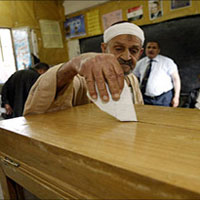The first democratic election in Egypt, closely monitored around the world, saw the Muslim Brotherhood take the lead, and second place going to either a coalition of Salafi parties or the liberal Egyptian Bloc -- much to everyone's surprise, Today's Zaman reported.
Non-official results indicate that in the first round of Egypt's elections, the Freedom and Justice Party (FJP), a political offshoot of the Muslim Brotherhood, will secure the support of 40 percent of voters while the al-Nour Party-led Salafi groups will garner nearly 20 percent of the overall votes. The Egyptian Bloc, which will presumably compete for second position with the Wafd Party, is expected to get almost 20 percent of the vote.
Falling short of expectations, the nation's deep-rooted Wafd is rivaling another Islamic party, Al Wasat, to make it into fourth place.
The first leg of the elections, which took place over two days, is likely to have seen a turnout rate of as high as 70 percent. In the clumsily designed election system, two-thirds of the candidates are running for parliament from party lists while the remaining candidates are running as independents.
Unless independent candidates fail to secure an absolute majority of votes in their respective constituencies, they will compete against their rivals in the second leg of the elections, to be held next week.
These same Salafi groups that made their weight felt in the final days of the Mubarak regime by supporting the government and standing against those seeking reform, issuing a pro-government religious statement which gave permission for the assassination of government opponents, have achieved electoral success in the ongoing elections.
However, in terms of belief and politics, a large segment of the people who voted for Salafi groups perceive them as being different from other Salafi/Wahhabi groups in Saudi Arabia and other countries.
The first leg of elections encompassed Cairo and Alexandria, home to the elite and liberal segments of society, and provinces such as Kafr el-Sheikh, Asyut, Faiyum, Red Sea, Luxor, Port Said and Damietta as well as 27 other provinces.
The second leg is set to take place on Dec. 14 in the provinces of Giza, Beni Suef, Monufia, Sharqia, Beheira, Suez, Ismailia, Sohag and Aswan. The third and last leg will be held on Jan. 3, and in this way 498 members of the People's Assembly will be elected. Ten more members will be appointed by High Military Council President Hussein Tantawi.
The Salafi bloc, consisting of the Egyptian Alliance -- comprising Al Nour, Asala and Fadela -- and the Construction and Development Party was formed on Nov. 3 and organized itself nationwide in a short period of time.
Ahmad Ata, a seasoned columnist from one of the nation's leading independent dailies, Shuruk, in speaking to Sunday's Zaman said the election victory of the Muslim Brotherhood and the Salafi parties should be read as a good sign for Egyptian democracy. Noting that these parties will soften their tone in the democratization process, Ata underlines that the Islamic parties, including the Salafis, in Egypt are non-violent, unlike their political equivalents in Pakistan and Afghanistan.
Stressing that the Salafi groups much feared by the West and the nation's liberals will soften their language out of political considerations, he predicts that the FJP, which is expected to be commissioned by the Egyptian Supreme Military Council (SCAF) with the task of forming the government, may want to form a coalition with parties adopting a more liberal stance rather than the Salafis. For him, the non-homogeneous structure of Islamic parties presents a great advantage for the country.
Saad al-Katatny, the secretary-general of the FJP, told the Financial Times his party was adamant that the next government should bring together all political groupings in Egyptian society and not just Islamist factions.
"It should take account of Islamists, liberals and leftists in order to guarantee stability," he said.
"Even if the FJP secures a majority, it will not form a government by itself or with another Islamist party. It has to include all existing currents, even ones that are not in parliament." Mohamed Abdel Kader from the Ahram Center for Political and Strategic Studies points out that the Muslim Brotherhood is addressing social problems while others fight against the military, prompting the masses to take to the streets in protest.
According to Kader, the Islamic parties' cooperation with the military has played a major role in the elimination of political instability that has affected the whole country.
Underlining that the Islamic parties will exhibit the same attitude during the government formation process, Kader highlighted the Muslim Brotherhood's efforts to include liberal and leftist groups in the process.
However, the lack of having a deep-rooted tradition of democracy and the attitudes of some political parties, which act in an ideological manner, are considered the biggest challenges for coalition talks.
According to Egyptian press reports, if the SCAF commissions the FJP with government formation, the Wafd Party will be the FJP's first choice. Currently, the SCAF has the authorities of the president. The Wafd Party had announced its alliance with the National Democratic Alliance for Egypt that include more than 30 political parties, including the FJP, but later decided to end the alliance with the bloc because of the disagreements about the candidate lists.
Many wonder how the Egyptian bloc, established as a bulwark against Islamic groups, will react to the coalition offer. This party, sponsored by Naguib Sawiris, a Coptic billionaire, is known to be supported mainly by Christians.
The presidential elections are expected to be held in June after the elections to form the People's Assembly and Consultation Assembly, which are important as they will draft the first democratic constitution in the country.
If the constitution is approved in a referendum, Egyptians will go to the polls to elect the members of parliament in 2013.






